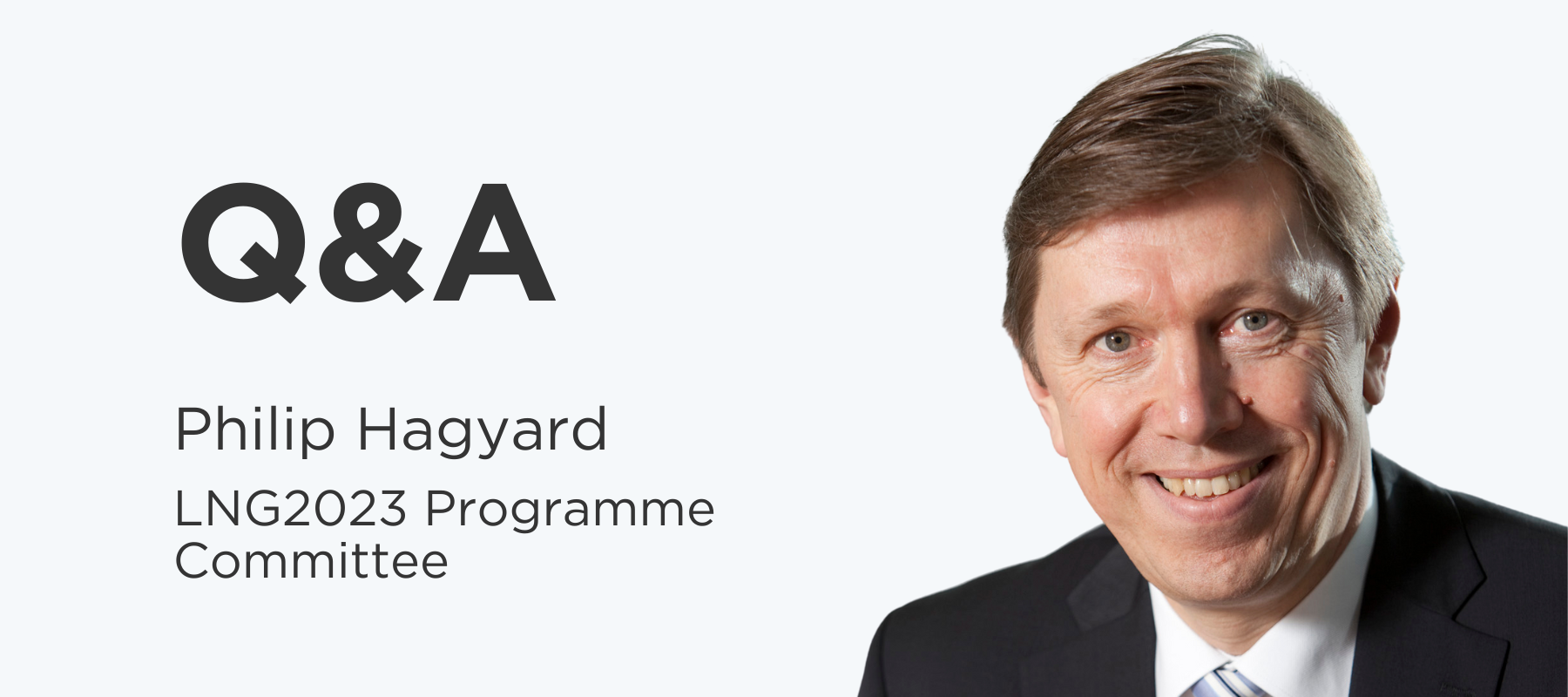Author: Joseph Murphy, Natural Gas World | 9 May, 2023



These are times of great change, with record demand for more reliable and competitive LNG and big question marks about how to match this with climate targets, Philip Hagyard, LNG2023 Programme Committee Chair, and LNG Advisor at Technip Energies, tells NGW.
Author: Joseph Murphy, Natural Gas World | 9 May, 2023

In a nutshell, why is LNG2023 a must-attend event this year?
At the risk of repeating what can be found on the event website my simple answer would be that it’s the year’s largest and most influential conference dedicated to LNG. These are times of great change with record demand for new sources of reliable and competitive LNG supply and big question marks about if, how and when to invest in a way that enables governments to meet climate targets. The number of countries for which LNG is a vital fuel has suddenly jumped to include much of Europe, China and India, in addition to the traditional JKT group. The use of LNG as a marine fuel has taken off. So such an event is more important than ever.
I would highlight that LNG2023 is an industry owned event and that the format has been reinvented. As it’s organised under the patronage of three leading not-for-profit industry organisations the PC (Program Committee) has had the freedom to orient content based on audience usefulness and to add features that bring long term benefits to all, such as the permanently available archive of past papers under ClubLNG.
What’s new for delegates this year versus previous conferences. How has the conference program been prepared to maximise value for industry stakeholders across different industry sectors?
Early publication of papers means delegates will be able to kick off their participation many weeks before travelling to Vancouver. Selected abstracts are already available through the website and the papers will be made available to registered delegates in advance via the event app. This means that there will be the opportunity, not to say the expectation, that delegates will inform themselves of the conference program in the months, weeks and days before the event. Delegates will be able to “like” or preselect papers of interest, and to ask questions in advance for consideration by the authors and moderators. The objective is that Vancouver will be oriented to meeting the speakers, with an organised opportunity for post-session debriefing in the concourse area.
A second feature will be the attempt to “right size” the rooms to suit the audience. The biggest breakout room will be reserved for sessions expected to draw the biggest audiences – typically with general interest papers on the global LNG market, certain technical themes or reporting on large well-known projects. This room can act as the default selection for busy delegates that find themselves with a break in their day without having a clear idea of the programme. We haven’t given up on the idea of having more intimate roundtables to address highly specialised papers on points of technical finesse. At the time of this interview delegates are being surveyed to better understand the relative interest for each of the four parallel sessions in each block.
Lastly, we believe delegates will appreciate the way the conference is broken down into six audience-oriented themes. These were first defined in 2019 after collecting hundreds of topics listed by the program committee as being of current interest to the LNG industry. These were screened and grouped into themes intended for a particular audience. So, someone interested in shipping can focus on the 5th theme, although they obviously have the option to look elsewhere. He or she will find several dedicated conference sessions at which presentations of selected papers will be made along with information on related specialist papers on touch screens in the Discovery Hub. The themes have also been matched with the spotlight sessions at which senior figures from the energy industry have been invited to give their organisations viewpoint and strategy.
As PC Chair I was keen to abandon the previous distinction between so-called strategic, commercial and technical streams, simply because they need to be addressed together. For example I think we're all aware of the impact that greenhouse gas emissions generated in any given LNG supply chain have on LNG trading, project finance and government approvals. The reduction of these emissions is a poorly understood and highly complex technical issue implying massive investment.
Walk us through the responsibilities of the Programme Committee, of which you are Chair
The Program Committee is responsible for designing and presenting the LNG2023 conference programme based on papers selected on merit. The PC has picked papers we believe to be interesting, innovative and relevant to the prevailing preoccupations of the LNG industry.
The PC consists of representatives from around 40 companies active in the LNG industry. Members are co-opted by the PC Chair based on recommendation, reputation, and the ability to contribute to a diverse program. Decisions are typically unanimous. Any conflicts can be determined by voting with the PC Chair’s decision as final.
The PC defined the main themes for LNG2023 after collaborating on listing all major questions of the day, fixing the terms of the call for abstracts and selecting papers for presentation at the conference in sessions or as digital, interactive posters. The conference sessions, as distinct from plenaries and spotlight sessions, will be moderated by members of the PC.
As a result of the four-year gap between events coupled with changes in the industry, about half of the PC members are participating for the first time. This includes myself, in the role of PC Chair for the first time although I have been on the LNG Event Series Steering Committee in other capacities since LNG15 in Barcelona (2007). So it’s been a challenging but rewarding collective effort.
What are the main lessons that policymakers, investors and the LNG industry should take from the present energy crisis? How can we ensure a more stable energy transition moving forward?
I think the lasting lessons from this latest crisis are how quickly the energy landscape can change, how important LNG is to energy security and that it is the rate of addition of extra liquefaction capacity that determines the rate of market growth.
The restart of coal-fired power plants in several countries was widely commented on as it showed the lack of flexibility in LNG along with other low-carbon energy sources, and that the energy agenda needs to address both the immediate and essential needs of the population, and climate change.
We’ve seen LNG diverted to Europe from Asia and the rapid buildup of import capacity, mainly using floating terminals. A striking example is the installation of three receiving terminals in Germany in less than a year, where previously there were none.
On the other hand, although certain liquefaction projects have moved off the drawing board into execution slightly more quickly, we haven’t yet seen any FID’s for projects that weren’t already planned in Q1/2022. It takes time and the decision process is long and complex. So one of the lessons is to look for ways to shorten the development schedule of liquefaction capacity and to secure this schedule, making it more predictable, while taking no shortcuts with the total cost of ownership or the elimination of carbon emissions. There is currently an emerging consensus that the answer lies in modularised and standardised units, at least for the critical liquefaction units.
What should be the mission-critical aims of the LNG industry in reducing operational emissions as much as possible?
The conference programme includes papers on decarbonization with the reduction of CO2 emissions as a target. Several papers address CO2 emission reduction at different points along the chain, with most of the emphasis on liquefaction. Strategies for brownfield assets can be quite different from those for new plants. We have sessions on sustainable LNG and repurposing of assets using techniques such as biogas, methanization of recycled CO2 and methane pyrolysis. These are new subjects compared to past events, but they discuss issues that can usefully prolong LNG industry assets.
One candidate for prioritisation is to substantially reduce if not completely eliminate methane emissions. We'll see what happens with this relatively new topic at the conference, but it is already an LNG industry objective. The recovery of a saleable fuel that is being lost to leakage is essential for reducing the GWP global warming potential (GWP) of LNG, but it also makes economic sense. This is essentially a question to be addressed by gas producers and distributors rather than designers and operators of liquefaction plants. Liquefaction plants are designed to be leak proof for obvious safety reasons and for a long time now, there has been a strong drive to include features at the design stage that eliminate the need for operational venting or flaring of hydrocarbons, except in emergency situations.
What role is Technip Energies playing in the pursuit of these goals as well as ensuring future energy security and affordability?
As an engineering and technology company for the energy transition, in LNG we primarily provide design and project delivery of liquefaction terminals. We offer state of the art designs and integrated CCUS solutions that minimise emissions and improve safety, efficiency, and reliability of new LNG projects, while securing certainty in cost and delivery schedule through robust project management. We also provide consultancy services for early project stages, and our Loading Systems entity is a market leader in mechanical loading arms. Our biggest LNG projects at present are QatarEnergy NFE, QatarEnergy NFS and Coral Sul FLNG. Our long history in LNG always included a place for technology that has regularly been on show at the LNG Event Series. Today our focus is on using the lessons of large, modularized projects in the Arctic and FLNG offshore to provide our clients with a modularized, standardised and electrified low carbon liquefaction train that shortens time to market, while maintaining the economies of scale needed to rein in future operating costs.
Author: Joseph Murphy, Natural Gas World | 9 May, 2023